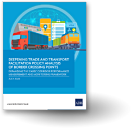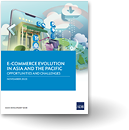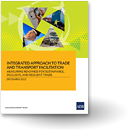Spotlight Archives
- ADB Working Paper Series on Regional Economic Integration No. 54 - The Political Economy of Regional Cooperation in South Asia (July 2010)21 July 2010Independent consultant V.V. Desai discusses factors that led to the sub-par performance of the South Asian Association for Regional Cooperation. He concludes that building cordial interstate relations is a critical first step to improving its performance. Read more.
- July 2010 Asia Economic Monitor20 July 2010With emerging East Asia’s V-shaped recovery on track, it is now time to unwind the policy stimulus that helped power the solid domestic demand that kept growth strong, according to the July issue of the Asia Economic Monitor. The sustainability of the recovery will depend heavily on the timing, policy mix, and pace at which economic stimulus is withdrawn. Read the news release. Download the report.
- Seminar Series on Regional Economic Integration: The Regionalization of the World. What does it mean for Asia? (19 July 2010, 2:00 - 3:30 pm, Auditorium Zone A, ADB Headquarters)13 July 2010Prof. Luk Van Langenhove, Director, Comparative Regional Integration Studies Institute of the United Nations University, will discuss the relation between sovereign states and regional institutions in Europe’s experience, comparison with Asian regional integration and its global implications. Confirm participation with Liza Cruz. This seminar is organized in cooperation with the Asia-Europe Foundation (ASEF) as part of its 33rd Asia-Europe Lecture Tour in Singapore, Manila, Bangkok, Seoul and Shanghai.
- ADB Working Paper Series on Regional Economic Integration No. 53 - The Role of Membership Rules in Regional Organizations June 2010In this paper, Judith Kelley explores how membership rules affect the ability of organizations to promote regional integration. The paper studies the advantages and disadvantages of including versus excluding countries, and the benefits of having multiple regional organizations in a form of layered integration. Drawing especially on the European experience, the paper then discusses ways to vary membership of different cooperative efforts within an existing organization. The paper ends by considering the implications for Asia. Download the paper.
- Report: The Future Global Reserve System - An Asian Perspective (June 2010)24 June 2010A reform in the global reserve system is critical to avoid a repeat of the recent global economic crisis and Asia's fast recovering countries need to cooperate to ensure a smooth transition to a multi-currency alternative, says a new report from the Asian Development Bank and Columbia University's Earth Institute. The report, The Future Global Reserve System - An Asian Perspective, says that while the US dollar will remain the leading currency of international exchange for now, a rebalancing in the global economy means that in the future, a wider range of currencies will need to be used to settle trade and investment. Read the press release. Download the report or read it online.
- Seminar Series on Regional Economic Integration: The Doha Round, Regionalism, and Challenges to the International Trading System (25 June 2010, 7217/18 North, ERD Conference Room, ADB Headquarters, Manila)23 June 2010Robert Teh, Counsellor at the World Trade Organization (WTO), will discuss the role of the WTO in the current state of the Doha Round amid rising regionalism and the challenges it poses to the international trading system. He will present arguments why despite the difficulties encountered in concluding the round and the rise of regionalism, the WTO will remain indispensable for managing the many challenges that confront the international trading system. Confirm participation with Liza Cruz.
- ADB Working Paper Series on Regional Economic Integration No. 52 - Methods for Ex Ante Economic Evaluation of Free Trade Agreements23 June 2010In this paper, David Cheong discusses three methods—trade indicators, Software for Market Analysis and Restrictions on Trade (SMART) in World Integrated Trade Solutions (WITS), and the Global Trade Analysis Project (GTAP) model—for evaluating the potential economic effects of free trade agreements (FTA). For each method, the author identifies aspects of a FTA that can be evaluated, describes the data sources and software requirements, interprets the output results, and discusses the strengths and limitations. As illustrations, the methods are applied to Cambodia, Lao PDR, and Viet Nam. Download the paper.
- ADB Trade and Investment Integration Course (Manila, Philippines; 21-25 June 2010)21 June 2010As an integral part of ADB's Regional Cooperation and Integration Strategy adopted in 2006, the Office of Regional Economic Integration is conducting the ADB Trade and Investment Integration Course under RETA 6497: Capacity Building on Regional Trade Integration and Facilitation (financed by the Japan Special Fund). The Course is on 21-25 June 2010 at the Discovery Suites, Manila, Philippines. The participants are government officials of developing member countries in Asia and the Pacific who are involved in trade policies. For inquiries, contact the Course Director, Shintaro Hamanaka.
- Business Responses to Free Trade Agreements in Asia - Parallel Session at the 16th Conference of Montreal: Innovating to Succeed in a New Global Market (Quebec, Canada; 9 June 2010)7 June 2010Amidst the stalled Doha global trade talks, free trade agreements in economically important Asia are increasingly becoming a significant trade policy instrument - with nearly 50 free trade agreements in effect today and many more in the pipeline. The session, Business Responses to Free Trade Agreements in Asia will review recent trends in the proliferation of FTAs, their impact on business, and highlight Asia's particular interest in cross-regional trade agreements involving North America and Canada, as well as the European Union. This event is organized by ADB and ADBI. Read more.
- Free Trade Agreements in East Asia: A Way Toward Trade Liberalization?June 2010Masahiro Kawai and Ganeshan Wignaraja discuss the proliferation of FTAs in East Asia—45 FTAs have been adopted over the last decade, with the People's Republic of China, Japan and the Republic of Korea taking the lead. The brief also examines the varieties of national FTA strategies in Northeast and Southeast Asia and analyzes information on FTA use, impediments, and rules of origin. Finally, it explores a possible way forward, with the formation of a region-wide FTA seen as a way to achieve a deep WTO Doha trade deal.Download the policy brief on FTAs in East Asia. This paper was presented at the International Economic Forum of the Americas - Conference of Montreal on 9 June 2010.




